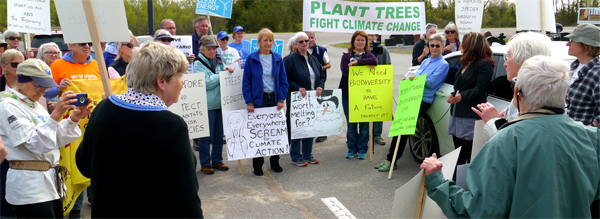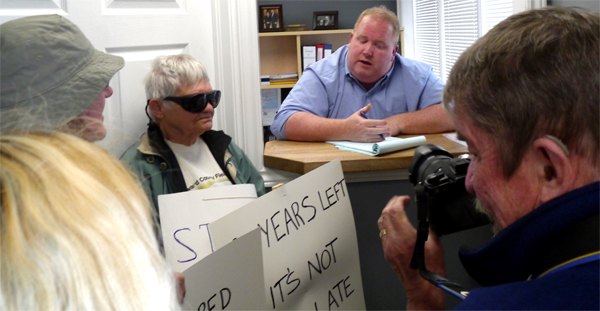Naturalists protest provincial cuts to environmental programs
Administrator | May 23, 2019 | Comments 2
 Story and photos by Sharon Harrison
Story and photos by Sharon Harrison
Local naturalists who last year praised MPP Todd Smith’s work to save endangered species by eliminating industrial wind turbines on the South Shore of Prince Edward County, this week protested his government’s proposed elimination and reduction of many environmental programs.
The Prince Edward County Field Naturalists, Quinte Field Naturalists and other concerned citizens rallied at Smith’s Prince Edward County constituency office Tuesday – on United Nations International Day for Biological Diversity – to voice concern about endangered species protections, carbon emissions, wetlands protection, the 50 Million Tree program and flood programs by conservation authorities.
The message and plea to Smith, from the largely female crowd of about 50 members, was to express concern over the direction the provincial government is taking on environmental and natural heritage issues, including biodiversity and climate change. Many of the naturalists expressed disgust with a government they helped elect, noting a sense of betrayal by their representative.
The call to action was prompted by a recent report on the State of Biodiversity in the World by the United Nations’ Intergovernmental Science–Policy Platform on Biodiversity and Ecosystem Services. It showed one million species are on the brink of extinction worldwide.
Sheila Kuja-McKay, of the PEC Field Naturalists, said while a meeting had earlier been requested with MPP Smith, his schedule didn’t allow for a meeting with the group until July. As well as being Bay of Quinte’s MPP, he currently serves as both the Minister of Economic Development, Job Creation and Trade and Government House Leader.
In the meantime, the group felt compelled to bring a number of urgent issues to his attention as more than 230 plant and animal species face extinction in Ontario.
“We think it is important to focus on the protection of the habitat. The habitat is what needs to be saved, thereby saving the endangered species,” said Kuja-McKay.
Of utmost concern to the groups is the proposed plan dealing with endangered species, as it favours development over the protection of species at risk, she said.
“If the new plan had been in place as the Endangered Species Act during the Ostrander Point (industrial wind turbine) battle, the company would have paid into a fund, and the habitat would have been destroyed,” said Kuja-McKay. “We couldn’t have gone to the Environmental Review Tribunal (ERT) because there would have been no recourse. The government would have approved the company’s need to destroy the Blanding’s Turtle habitat, put all the roads in as well as the turbines, and we would have had no say at all.”
“Habitat, especially of endangered species is one of the main criteria for biodiversity; the more plants and animals that are protected in the habitats of the endangered species are usually the ones that are most important for continuing that biodiversity,” said Kuja-McKay.
Science, she says, is no longer a valid contributor in decision making.
“It comes down to how much will a company pay to destroy our biodiversity. We feel this is wrong. Stronger laws, not weaker ones with loopholes for developers, should be in place to protect species at risk and their habitats. The pay-to-slay law proposed is unacceptable.”
Kuja-McKay said there are many other types of developments that could destroy Whip-poor-will, Blanding’s Turtle and other species-at-risk habitat in the County and the province.
“Under the new law, endangered species could be killed, as long as the proponents pay into a fund to study endangered species, not save them,” she said. “As we already know, studies don’t bring back an endangered species once its habitat has been destroyed, which was the whole point of both the Ostrander Point and White Pines ERTs.”
Amy Bodman, of PEC Field Naturalists, said wetlands also sequester large amounts of carbon. Ducks Unlimited has been doing studies on the ability of wetlands (if we can dramatically increase their presence) to reverse climate change. It’s not only trees that sequester vast amounts of carbon – wetlands and grasslands do too!
“The governments don’t recognize even temporary or the ephemeral wetlands as important habitat,” said Bodman. “We are very rich in this region with wetlands and they need to be protected, and expanded.”
 While organizers had hoped Smith would be present Tuesday, Adam Bramburger, constituency assistant confirmed he was not available.
While organizers had hoped Smith would be present Tuesday, Adam Bramburger, constituency assistant confirmed he was not available.
A decision to enter the office by a number of the organizers meant Bramburger was faced with a litany of questions from frustrated and angry protestors who demanded answers and explanations. While the interactions were heated, everyone remained civil and Bramburger provided a petition sheet for protestors to sign.
“We are just infuriated with everything they are doing, so we said what a great way to spend Biodiversity Day,” said Myrna Wood, of the PEC Field Naturalists.
“I would like to mention endangered species because I don’t think we realize that word has changed,” said Wood. “It used to mean very rare species that you had to go somewhere special to see, but that’s not true anymore. The barn swallow, which all of us have seen hundreds of them every year for all of our lives, are now on the endangered species list.”
Wood explained that since the barn swallows live on insects, it is suspicious that the over-use of pesticides in society is what is helping to cause this problem. “We really need to take this seriously now,” she said. “With common species endangered, we only have 11 years left.”
Kuja-McKay said it is important to stand up for endangered species and biodiversity in the whole province.
“Funding has been eliminated from, or drastically cut to many worthwhile and some essential natural heritage programs; the Ministry of Natural Resources and Forestry and Conservation Authorities have sustained huge cuts to their budgets.”
Funding to programs such as 50 Million Tree was cut completely, and Ontario’s Invading Species Awareness Program (ISAP) was slashed by 43 per cent according to organizers, where they noted ISAP was a 27-year partnership between the Ontario Federation of Anglers and Hunters and the Ministry of Natural Resources and Forestry.
“That hurts us; that hurts biodiversity, it hurts all of the natural environment and natural heritage, so it’s really important that those programs continue,” Kuja-McKay said. “It just doesn’t make sense to have those kinds of cuts. In the short-term that might be fine for fiscal shortfall, but in the long run, it is going to cost us way, way more. Species will be gone, but in order to deal with those issues, it is going to cost millions of dollars.”
“For the MNRF, the budget cuts according to the 2019 budget, it’s $16 million less than last year, and $61 million less than the year before, and yet there’s more flooding, the problems are getting worse especially with climate change.”
Organizers said Ontario’s 50 Million Tree program is essential for mitigating climate change, as all trees remove carbon from the atmosphere.
“The Ford government’s short-sighted decision to eviscerate this program, with no plan to minimize the effects of their decision (balance fiscal restraint with the need to get the job done) will have major consequences,” said Kuja-McKay. “According to an OFAH article, investment in prevention reduces the future costs of managing invasive species that are known, from too many past examples, to far exceed any short-term savings. Also, as a result of this, community programs funded through the Biodiversity Education and Awareness Network (BEAN), under the umbrella of ISAP, have been eliminated.”
The field naturalists noted positivity in hearing the 50 Million Tree program will continue via private funding, but are distressed that funding for it was withheld by this government.
“As an initiative that could deal with ameliorating climate change it should be a priority worthy of our tax dollars,” said Kuja-McKay. “This makes it even clearer that the 50 Million Tree program is essential to provide for the future.”
Gerry Jenkison noted a recent report that mentioned there were three trillion trees in the world that sequester 400 gigatons of carbon.
“Planting trees can do us so much good,” she said. “This report was produced by an international team of scientists and they tell us that if we plant another 1.2 trillion trees, that would sequester 10 years of excess carbon. And that is something we can all do as private citizens, but also pressure our local, provincial and federal governments to get on board.”
One participant said, “Our goal is to get more trees, to get people to plant trees, to recognize the value of trees. Trees are a public asset,” she said, as another added, “They are a global asset.”
Another’s impassioned words directed to Bramburger said, “Frankly, we are in a climate emergency and Todd Smith has no business supporting tax cuts to corporations when we are in the middle of ecological disaster. It is shameful.”
The message they wanted to send to the provincial government is climate change, wetland protection, the increase in flooding and other environmental issues needs to be addressed immediately.
“We urge the government to look more closely at ways to deal with them. Protecting our natural heritage is essential for the social, economic and cultural well-being of all those who live here, and it’s our responsibility!” added Kuja-McKay.

Filed Under: Arts & Culture • Featured Articles • Local News
About the Author:
































Great article. Thanks to everyone at the protest for fighting this fight. Sorry I couldn’t make it this time. Regrettably, I’m sure there will be another opportunity.
Well written article. More people need to show their concerns ,as Ford and Smith continue to negatively effect life with the wrecking ball approach to save money. These rich politicians are going down with the rest of us, all their money won,t another minute buy.